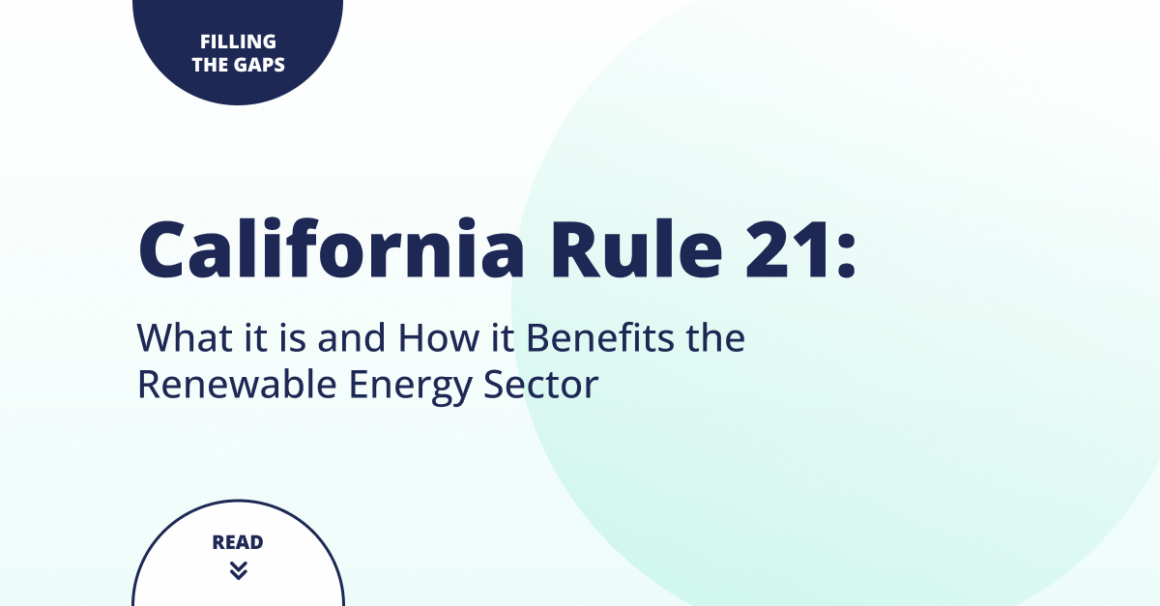California Rule 21: What It Is and How It Benefits the Renewable Energy Sector

Codibly has over 12 years of experience supporting clients with market integrations and protocol implementations. We know how critical compliance with California Rule 21 can be for our clients and have deep expertise guiding clients through the design, development and testing process to achieve certification.
What is California Rule 21?
California Rule 21, also known as the Renewable Energy Grid Integration (REGI) program, is a standard that describes the interconnection, operating and metering requirements for generation assets to be connected to a utility’s distribution system within the state of California. The tariff provides customers wishing to install generating or storage facilities on their premises with access to the electric grid while protecting the safety and reliability of the distribution and transmission systems at the local and system levels.
How does Rule 21 benefit the renewable energy sector?
There are several key benefits of Rule 21 for the renewable energy industry, each helping benefit a different stakeholder in the overall ecosystem. First, the customers. Customers who buy compliant inverters to support their residential system are able to receive incentives and participate in Demand Response programs to earn money and reduce the price of their system, helping them take advantage of spare power they have generated and stored. Second, the grid operators. Through the enablement of communication directly to customers across the territory, or aggregators grouping together multiple assets, the grid is able to avoid turning on costly, and polluting gas peaker plants when demand is highest, and can defer expensive long-term upgrades to capacity by treating these assets as part of the overall generation portfolio. Third, companies. While many states do not require compliance with a standard like Rule 21 to sell within their state, California, the largest renewable energy market in the US, does require it. In order to compete in California and build its reputation across the industry, of which leadership in this key market is a critical part, compliance with Rule 21 is essential. It can be a Win-Win-Win when taken all together!
Per-Device vs. Aggregator Approach
To achieve Rule 21 compliance, two distinct pathways emerge: the per-device and the aggregator approach. The per-device method involves individual certification of each energy resource, ensuring it meets Rule 21’s stringent standards. This is often suitable for smaller scale operations where individual control is paramount. Conversely, the aggregator approach, as detailed by Codibly in this dedicated article, opts for a centralized platform, aggregating multiple resources together for a streamlined compliance process. This method shines in larger, more complex systems, offering scalability and ease of maintenance.
Embracing the Future: Rule 21’s Evolution and Updates
Keeping pace with technological advancements and the dynamic nature of the renewable energy domain, Rule 21 has evolved significantly since its inception. In 2023, the regulation underwent substantial revisions to address the burgeoning role of Distributed Energy Resources (DERs) and to streamline the grid interconnection experience for renewable energy providers.
- Smart Inverter Functionality: Recent updates to Rule 21 include advanced technical standards for smart inverters, pivotal in maintaining the ebb and flow of energy delivery to and from the grid.
- Interconnection Process Transparency: The CPUC has mandated clearer interconnection processes, which translates to a more predictable and navigable experience for renewable energy developers.
- Energy Storage Systems Integration: With energy storage solutions gaining prominence, Rule 21 now explicitly outlines how these systems should interact with the grid, underlining their importance in a balanced and responsive energy supply chain.
- Enhanced Communication Protocols: The regulation calls for robust communication protocols between DERs and the utilities, ensuring that the grid operates harmoniously and responsively to fluctuations in energy supply and demand.
How to Navigate Rule 21 Compliance
Codibly’s commitment to the renewable energy sector extends to providing comprehensive insights and technological solutions pertinent to Rule 21 compliance. The company offers a range of services, including advanced grid analytics, custom interconnection platforms for various energy resources, and integration of energy storage systems, designed in accordance with Rule 21’s updated guidelines.
The approach is twofold: on one hand, Codibly caters to smaller energy projects requiring individualized certification, ensuring that each unit meets the precise standards set forth. On the other, for larger-scale operations, Codibly develops aggregator systems that streamline compliance, enhancing overall efficiency and system coherence.
Navigating the compliance landscape of Rule 21 can be daunting, but with proper expertise, businesses can approach this challenge with confidence. In another insightful article, Codibly outlines a comprehensive strategy for Rule 21 integration, detailing the steps for updating grid management systems, expanding renewable energy sources, and enhancing grid operations to adapt to this new energy paradigm.
Contact us for more information and let’s discuss whether Codibly is the right partner to support your business with its California Rule 21 journey!
If you need help with implementing California Rule 21, reach out to us. As a trusted technological partner, one of our Experts would be happy to support your business in the process!
contact us
Need expert guidance on your next energy project?
Reach out to us and discover how Codibly can offer tailored solutions to drive your business.